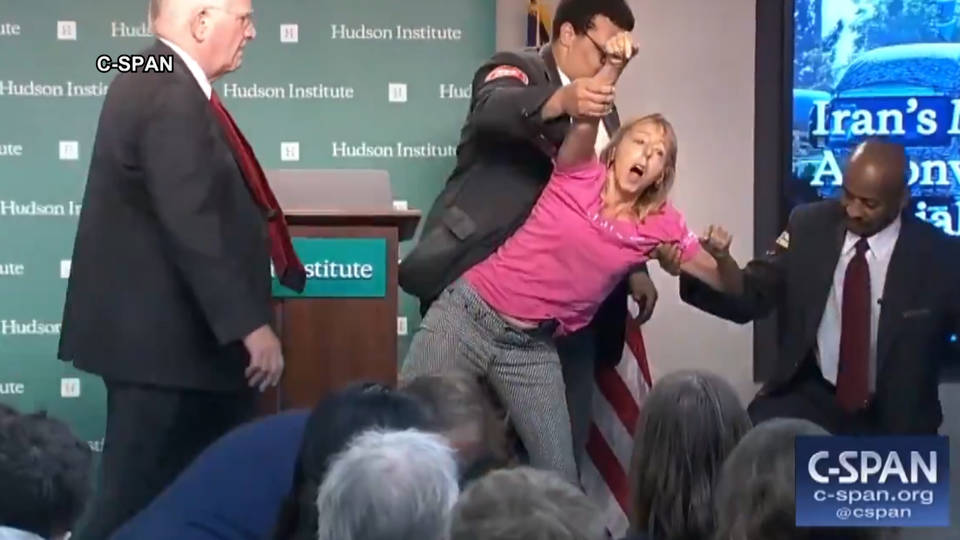“You Are Making a Case for War with Iran,” shouted Medea Benjamin, co-founder of United States-based feminist CODEPINK group as she being was forcefully evicted by two men at the Hudson Institute, a conservative think tank. On Wednesday, the institute, which is known for its “pro-corporate and war-mongering policies” was hosting a talk on US foreign policy on Iran by Brian Hook, Senior Policy advisor to US Secretary of State and US special envoy to Iran. As the discussion began, Benjamin rushed to the stage and protested against the ‘war-mongering policies’ of the US administration headed by President Donald Trump.
She accused that by backtracking from the Iran nuclear deal, Trump administration was making a case for yet another war in the Middle East and the US is not learning from the mistakes committed in Iraq.
Benjamin’s short speech, before she was forcefully evicted, is as follows; “That is the most ridiculous thing I have seen. The world community wants to keep the Iran nuclear deal. Our allies—the Germans, the French, the British—they want to keep in this deal. The world community wants to keep the deal. Let’s talk about normal countries. Let’s talk about Saudi Arabia. Is that who our allies are? They are the biggest threat to the world community. And let’s talk—you’re hurting me. You’re actually hurting me. I want to ask: Do you think these sanctions are hurting the regime, or are they hurting the Iranian people? They’re hurting the Iranian people. You are making a case for war with Iran. How did the war with Iraq turn out? You’re doing exactly the same thing we did in the case of Iraq. We don’t want another war in the Middle East. Let’s see, how did Iraq turn out? How did Libya turn out? We have the people of Syria suffering. And how dare you bring up the issue of Yemen? It’s the Saudi bombing that is killing most people in Yemen. So let’s get real. No more war! Peace with Iran!”
It was in 2015, Iran had agreed to cooperate in the Joint Comprehensive Plan of Action (JCPOA) or Iran Nuclear Deal with US, UK, France, Russia, China and Germany to moderate and monitor the development of domestic nuclear technology in Iran. Amidst numerous talks and dialogues at various levels, a landmark agreement was reached, in which Iran agreed to open its nuclear facilities to the monitoring of the authority of JCPOA, the International Atomic Energy Agency (IAEA).
But, on May 8, 2018, US President Donald Trump declared the withdrawal of the US from the Iran Nuclear Deal and reimposition of the sanctions on Iran. Trump has been opposing the deal since his election campaign and he had promised to review that deal if get elected. Trump and a large set of conservatives from the US perceived the deal as a weak one as it somehow permits Iran to go ahead with its nuclear programme. Such a decision from the Trump has been widely criticised all around the world and UN, and other signatories of the deal had registered their strong disappointment over the decision. Activists across the globe have warned that such a move by the United States was an attempt to break Iran’s economy and orchestrate regime change. Iran is of one the last standing countries in the oil-rich region of the Middle East, which challenges the ‘US hegemonic interests.’
The Trump administration had imposed the first round of sanctions over Iran on August 7, which bans Iran from the purchase of US Dollar, limits trade in gold and precious metals etc. Another round of sanctions targeting the oil trade of Iran is scheduled to be imposed in November 2018.
The Institute’s Vice President Lewis Libby and Director of its Centre on Islam Hillel Fradkin wrote an op-ed in September 2012 noting that the ‘uprisings’ in Syria and Libya were purportedly necessary for preventing Iran from acquiring nuclear weapons. “We have no reason to expect that the radical rulers of Iran will go gently if and when the revolution comes,” they wrote.
Suggesting towards the need for ‘foreign’ military intervention, the Libby and Fradkin’s article note that “Muammar Gaddafi and Assad fought back, and the Iranian mullahs hold even stronger ambitions and hatreds of the West. Indeed, the lessons they will likely draw from Libya and Syria is that a bloody-minded regime can repress its rebels if the regime can forestall outside assistance.”
Hudson Institute was founded in 1961 by the Herman Kahn, and Max Singer, Oscar Ruebhausen from the RAND Corporation, and its funders include industrialists, oil companies, corporate pharmaceuticals etc. There were reported instances in which researchers and publications of Hudson institute criticised organic farming, which later found to be funded by American Agrochemical and Agricultural biotechnology corporation, Monsanto. Monsanto is infamous for its notorious practices of lobbying and buying government official and exercising of its seed patent rights that destroy local farming practices across the globe. The narratives of the Hudson Institute on public health and social welfare are allegedly funded and influenced by corporate groups which aim at the scrapping of the national health insurance program and reducing government spending on healthcare.





